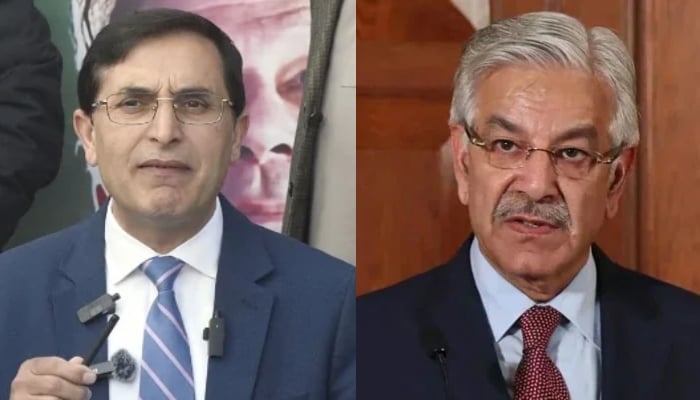Govt, opposition dismiss impression of favourite judge among candidates for CJ's post
Impression that Justice Yahya Afridi is government candidate for post of CJP is wrong, says Khawaja Asif
October 22, 2024

- Committee to decide who will be next chief justice, says Asif.
- Justice Mansoor's election as CJ can't be ruled out: PML-N leader.
- Gohar says PTI has never differentiated among judges.
ISLAMABAD: The ruling as well as leading opposition parties have dismissed the impression that they have a favourite judge among the top three judges from which a chief justice will be selected.
Leaders of the government and opposition expressed this in Geo News talk show "Capital Talk" on Monday.
As incumbent Chief Justice of Pakistan (CJP) Qazi Faez Isa is set to retire on October 25, the coalition government has kicked off the process of appointing a new top court judge following the enactment of the 26th Constitutional Amendment, which mandates the top judicial slot be filled three days before the incumbent's retirement.
Defence Minister Khawaja Asif said it would be wrong to say that the government had one favourite among the three senior most Supreme Court judges.
"The impression that Justice Yahya Afridi is a government candidate for the post of CJP is wrong,” he said.
The committee formed to elect the CJ, he said, would decide who would be the next chief justice from Justice Mansoor Ali Shah, Justice Yahya and Justice Munib Akhtar.
To a query, the Pakistan Muslim League-Nawaz (PML-N) leader said it could not be ruled out that Justice Mansoor would be the next CJ since he was among the three top judges.
"This is possible that anyone of Justice Mansoor, Justice Yahya and Justice Munib gets appointed," he said.
Talking in the same programme, Pakistan Tehreek-e-Insaf (PTI) Chairman Gohar Ali Khan said the impression was wrong that Justice Mansoor was PTI’s judge.
“This notion should end that we have some favourite judge. We have never differentiated among judges. We just say that decide the cases as per the law and constitution," he said.
"Since the Constitution had been amended, though we considered it unconstitutional, we would give names for the committee tasked to select the CJ, he said to a query.
Meanwhile, speaking in ‘Aaj Shahzeb Khanzada Kay Sath’, PML-N leader Rana Sanaullah said every party would have proportionate representation in the committee as per their strength in the parliament and the CJ would be selected with two-third majority, not simple majority.
The idea of appointment of CJ from three most senior judges was of the judiciary, not politicians, he said.
"If a senior puisne recuses himself [for CJ’s post] then the fourth most senior judge would be included in the top three [for election],” he added.
Answering a question, Sanaullah said Justice Mansoor was an extremely good and credible judge but the formula of senior most judge's appointment as the chief justice had inflicted profound damage to the judiciary and the country's judicial system.
“Those who held this seat earlier have done such things which were so pitiable,” he maintained.
Parliamentary body to elect CJ
In a notification issued on late Monday, the National Assembly Secretariat said that a 12-member Special Parliamentary Committee has been constituted for the appointment of next CJP.
The 12-member committee consists of eight lawmakers from treasury and four from opposition benches:
- MNA Khawaja Asif (PML-N)
- MNA Ahsan Iqbal (PML-N)
- MNA Shaista Pervaiz (PML-N)
- MNA Raja Pervaiz Ashraf (PPP)
- MNA Syed Naveed Qamar (PPP)
- MNA Rana Ansar (MQM-P)
- MNA Barrister Gohar Ali Khan (PTI)
- MNA Sahibzada Hamid Raza (SIC)
- Senator Ali Zafar (PTI)
- Senator Farooq H Naek (PPP)
- Senator Azam Nazeer Tarar (PML-N)
- Senator Kamran Murtaza (JUI-F)
The special committee will hold an in-camera sitting at the Parliament House at 4pm on Tuesday to finalise the name of the next chief justice among the three senior-most judges of the apex court with two-thirds majority.
Over the committee’s recommendation, the prime minister will send the nomination to the president for final approval.
If any of the three senior-most judges declines the position, the next senior judge will be considered for the top slot. Currently, Justice Mansoor is the most senior judge, followed by Justice Munib, and Justice Yahya.
Under the newly enacted law, the CJP’s term has been fixed at three years unless they reach the retirement age of 65, resigns sooner or is removed from office following changes to Article 179.
Moreover, if a top jurist has not reached 65 years age, he would still stand retired after completion of his three-year tenure.
Additionally, the selection of the chief justice will no longer be based solely on seniority, and instead, the choice will be made among the three most senior judges of the Supreme Court.
On the other hand, hours after constitution of the parliamentary committee, the PTI announced to boycott today's meeting of the Special Parliamentary Committee, constituted to appoint the next Chief Justice of Pakistan, refusing to join the process of appointing the next top judge.











